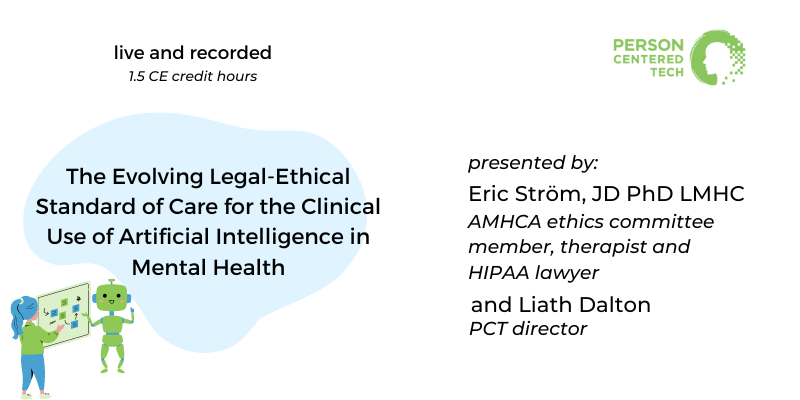1.5 CE Credit Hour Live and On-Demand Training on Clinical Use of Artificial Intelligence in Mental Health
The Evolving Legal-Ethical Standard of Care for the Clinical Use of Artificial Intelligence in Mental Health
presented by Eric Ström, JD, PhD, LMHC and Liath Dalton
1.5 legal ethical CE credit hours
On-Demand Self Study
Who (or What) is Talking to Your Clients?
Gain insights into the benefits and challenges of incorporating AI technologies into their practice, understand the clinical implications, and learn how to navigate legal and ethical guidelines while maintaining compliance with HIPAA regulations.
This continuing education course is designed to provide licensed behavioral health providers, operating as HIPAA-covered entities, with an introductory overview of the evolving clinical, ethical, and legal standard of care related to the use of artificial intelligence (AI) in behavioral health care.

Who is this event for?
This course is designed for solo practitioners, group practice leaders, and group practice clinical staff members. It is also suitable for practices that consist of 100% telehealth, 100% in-person, or a mixture of in-person and telehealth treatment.
Hybrid Practices
 Teletherapy Only Practices
Teletherapy Only Practices
In-Person Practices

I’ve been watching several of your CE programs and, while I’ve always been impressed with your services, I just have to say, your programs are excellently done with production and content and simultaneously warm and accessible. I really appreciate what you do!
Clinical Focus
Describe the current clinical standard of care in behavioral health practice and its relevance to AI integration in behavioral health care provision.
Consent and AI
Identify, and apply in-practice, the importance of informed consent and communication with clients regarding AI-assisted treatments.
Legal considerations
Analyze the current evolving legal and regulatory landscape governing AI use in behavioral health care, with a focus on HIPAA compliance for covered entities.
Impact of AI
Evaluate the impact of AI on patient confidentiality, privacy, and data security in the context of HIPAA compliance.
Practical Strategies
Develop a rubric for integrating AI technologies into behavioral health practice while ensuring compliance with legal, ethical, and HIPAA requirements.

Course Details
1.5 CE Credit Hour. Live, interactive webinar continuing education presentation on June 15th.
Ownership of (and perpetual access to) self-study on-demand CE training — produced from recording of live event — included in registration for live presentation.
Title: The Evolving Legal-Ethical Standard of Care for the Clinical Use of Artificial Intelligence in Mental Health
Authors/Presenters: Eric Ström, JD PhD LMHC; Liath Dalton, Director Person Centered Tech
CE Length: 1.5 CE credit hours, legal-ethical
Legal-Ethical CE Hours: 1.5 legal-ethical CE hour
Educational Objectives:
- Describe the current clinical standard of care in behavioral health practice and its relevance to AI integration in behavioral health care provision.
- Identify, and apply in-practice, the importance of informed consent and communication with clients regarding AI-assisted treatments.
- Analyze the current evolving legal and regulatory landscape governing AI use in behavioral health care, with a focus on HIPAA compliance for covered entities.
- Evaluate the impact of AI on patient confidentiality, privacy, and data security in the context of HIPAA compliance.
- Develop a rubric for integrating AI technologies into behavioral health practice while ensuring compliance with legal, ethical, and HIPAA requirements.
Syllabus:
Course Duration: 1 hour and 30 minutes
- Understanding Artificial Intelligence in Behavioral Health Care (15 minutes)
- Definition and explanation of artificial intelligence (AI) in behavioral health care
- Benefits, challenges, and potential applications of AI in the field
- Overview of common AI technologies and tools used in behavioral health care
- Clinical Standard of Care in Mental Health (20 minutes)
- Introduction to the clinical standard of care in behavioral health care provision
- Importance of evidence-based practice and clinical guidelines
- Integrating AI technologies within the clinical standard of care
- Review of the developing ethical guidelines and recommendations
III. Legal and Ethical Considerations (35 minutes)
- Legal Considerations
- Overview of relevant laws and regulations, including HIPAA – understanding the implications of AI use on privacy/confidentiality and data security
- Applicability of HIPAA Security Rule
- What constitutes Protected Health Information (PHI) – what’s in HIPAA’s “scope”
- Business Associate Rule – requirements and applicability for when a third party service provider “creates, receives, maintains, or transmits” Protected Health Information on behalf of a HIPAA covered-entity
- Rubric for AI use and integration in mental health care practice that’s consistent with HIPAA regulations and licensure requirements
- Ethical considerations in AI-assisted behavioral health care and AI integration in behavioral health care practice
- Ethical principles and guidelines for AI use in behavioral health care
- Ensuring patient autonomy, privacy, and consent in AI-assisted treatments
- Informed consent and transparency when using AI tools in behavioral health practice
- Responsible Integration of AI in Behavioral Health Practice (20 minutes)
- Strategies for selecting and implementing AI technologies in compliance with HIPAA and ethical guidelines
- Staff training and education on AI technologies and their ethical use
- Establishing safeguards for data protection, security, and confidentiality
- Ensuring ongoing professional development and training for providers
Meet Our Presenters
Presented by
Eric Strom JD PhD LMHC and Liath Dalton

Eric Ström JD PhD LMHC, is an attorney and Licensed Mental Health Counselor in Seattle, Washington. As an attorney, Eric provides legal counsel, consultation, and guidance to mental health professionals. Eric’s counseling practice is focused on providing counseling services to combat veterans as well as providing supervision and consultation to other clinicians. Eric currently serves on the American Mental Health Counselors Association Ethics Committee, and is the ethics advisor for the Washington Mental Health Counselors Association. Eric has taught a range of courses in counseling and professional ethics at a variety of graduate and undergraduate programs.
Eric earned a PhD in Counselor Education and Supervision at Oregon State University, a Master of Arts Degree in Counseling Psychology from the Northwest School of Professional Psychology at Argosy University Seattle, graduated cum laude from Wayne State University School of Law in Detroit Michigan, attended the Hague Academy of International Law in the Hague Netherlands, and received a Bachelor of Arts degree in Linguistics from the University of Michigan.

Liath Dalton is PCT’s director and a co-owner. Liath is especially passionate about helping therapists be resourced and supported in navigating the security compliance process and identifying the solutions and processes that meet the particular needs of their practices. Liath’s consultation area of expertise is focused on selecting the right combination of services and tech that not only meet the legal-ethical needs of mental health practices, but also the functionality, efficiency, and cost-effectiveness needs as well.
Resources & Citations
-
- American Association of Marriage and Family Therapists. (2015). Code of Ethics . Alexandria, VA: Author.
- American Counseling Association. (2014). ACA Code of Ethics. Alexandria, VA: Author.
- American Mental Health Counselors Association. (2020). American Mental Health Counselors Association Code of Ethics. Alexandria, VA: Author.
- American Psychological Association. (2010, and 2016 amendments). American Psychological Association Ethical Principles of Psychologists and Code of Conduct . Washington, DC: Author.
- National Association of Social Workers. (2008). Code of Ethics . Washington, DC: Author.
- National Board for Certified Counselors. (2023). Code of Ethics . Greensboro, NC: Author.
- Rubeis, G. (2022). IHealth: The Ethics of Artificial Intelligence and big data in mental healthcare. Internet Interventions, 28, 100518. https://doi.org/10.1016/j.invent.2022.100518
- US Dept. of Health and Human Services. (2006). HIPAA Administrative Simplification . Washington, DC: Author.
- US Dept. of Health and Human Services. (2013). HIPAA Omnibus Final Rule . Washington, DC: Author.
Accuracy, Utility, and Risks Statement:
This program discusses strategies for complying with HIPAA and some other US Federal rules. It may not include information on all applicable state laws. Misapplication of the materials, or errors in the materials, could result in non-compliance with applicable laws or ethics codes.
Conflicts of Interest: None stated.
Commercial Support: none.
